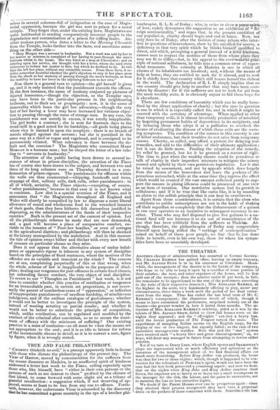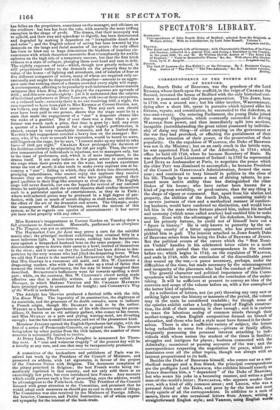THE THEATRES.
ANOTHER change of administration has occurred at Covent Garden : Mr. CHARLES KEMBLE has quitted office, leaving an empty treasury, and Mr. ALFRED BURN is to be his successor at Christmas. Mean- while, the management of the theatre is in the hands of the company, who hope to be able to keep it open by a sacrifice of some portion of their salaries : the rent, and other expenses of the house, will be first paid out of the receipts ; then the salaries under 3f. per week, in full ; the remainder to be apportioned to the rest of the performers according to the ratio of their respective demands ; Miss ADELAIDE KEMRLE, RS the highest in the scale, very handsomely offering to play, under any circumstances, three times a week until the period of her final retire- ment from the stage. Thus has ended the last brief term of Mr. C. KEMBLE'S management ; the disastrous result of which, though it seems to have astonished the performers, surprised nobody out of the theatre—the greater wonder is, bow it lasted three months. The at- traction of Miss ADELAIDE KEMBLE'S celebrity, aided as it was by the talents of Mrs. ALFRED Shaw, failed to draw full houses even on the nights they appeared ; and the "off-nights " entailed a heavy loss, until the recent production of The Tempest turned the scale. The experiment of mangling Italian operas on the English stage, for the display of one or two singers, has signally failed ; as the ruin of two successive managements testifies. Both this and the " star " system have received such "a heavy blow and great discouragement," as, we hope, will deter any manager in future from attempting to revive either practice. Yet if we turn to Drury Lane, where English operas and SHAEEPERE'S plays are represented with as much efficiency and splendour as the resources of the management admit of, we find financial affairs not much more flourishing. Before King Arthur was produced, the house was shut for two or three nights; which, though it happened to be con- venient for the rehearsals of PURCELL'S opera, would not have been the case had the box-book presented a promising aspect: and now we hear, that on the nights when King John and King Arthur combine their forces, the expenses are so heavy as to leave but a small recompense to the manager for the risk, the labour, and the pains he encounters, not to mention the loss on less attractive nights. We doubt if the Patent Houses ever can be prosperous again : since they attained their present overgrowth they have been a perpetual drain on the pockets of those connected with them. Sometimes the loss has fallen on the proprietors, sometimes on the manager, and ofttimes on the creditors : but loss has been the rule, with scarcely the most trifling • exception in the shape of profit. The drama, that their monopoly was to uphold, and their size and splendour to dignify, has been deteriorated and degraded by making it dependent on "inexplicable dumb show and noise " ; and the English school of acting has been lowered by the demands on the lungs and facial muscles of the actors : the only effect has been to blow out to huge dimensions the bladders of bombast cir- cumstance with which theatrical monarchs float triumphantly for awhile mpborne on the high tide of a temporary success, but that the first hitch reduces to a state of collapse, plunging them over head and ears in debt. The nightly expenses of rent—which, though now greatly reduced, is still proportioned rather to the demands on the property than to the value of the house—of lighting and attendants, and of salaries of four or five different companies of actors, many of whom are required only oc- casionally and might be dispensed with altogether—amount to an aggre- gate sum that nothing short of a theatre crowded every night will repay. A contemporary, affecting to be peculiarly well-informed on these matters estimates that when King Arthur is played the expenses are upwards of 300L; and this now occurs nightly : yet it is understood that the salaries of individual performers at Drury Lane are, with two or three exceptions, on a reduced scale ; certainly there is no one receiving 100/. a night, the slim reported to have been paid to Miss Kum= at Covent Garden, nor, we believe, any thing like that amount. That any such sum should ever have been paid to one person, shows that the stage must be in a state that made the engagement of a " star " a desperate chance like the stake of a gambler. But if ever there was a time when a per- former was worth such a price, that time is gone by : half, nay even a quarter of a hundred pounds for a single night's performance, is absurd, except in very remarkable instances, and for a limited time. RACHEL'S last engagement entailed a heavy loss on the manager : Hu- Dm, who, if he were to consult his reputation, would be heard no more, still lingers on the stage, for he says, "I cannot make up my mind to take leave of 1001. per night." CHARLES KEAN prolonged the duration of his factitious celebrity by stipulating for 50/. per night. Thus, the exces- sive remuneration of individuals is injurious, not to managers only, but to the mass of performers, and, which is of more importance, to the drama itself. It not only induces a few great actors to continue on the stage when their powers are on the wane, but renders exorbitant terms the test of merit: it also tends to make every aspirant aim at be- coming a " star " ; failing in which, they sink down into discontented, grudging subordinates, who cannot enjoy the applause they receive became they are disappointed, and who have perhaps marred their good qualities in their frog-like attempts to rival the ox. The English stage will never flourish, nor can the hoped-for revival of our national drama be anticipated, until the several theatres shall confine themselves each to a particular species of entertainment, as they do in Paris ; where well-selected pieces may be produced in a high degree of per- fection, with just as much of scenic display as shall assist, not disturb, the effect of the art of the dramatist and actors. The Olympic, under the management of Madame VESTA'S, showed the success of this system, so far as regards one species of entertainment : it has never yet been tried properly with any other.



























 Previous page
Previous page